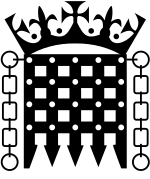Hugh O'Neill, 1st Baron Rathcavan
Robert William Hugh O'Neill, 1st Baron Rathcavan, PC, PC (Ire), DL (8 June 1883 – 28 November 1982), known as Sir Hugh O'Neill, Bt, from 1929 to 1953, was an Ulster Unionist member of both the Parliament of the United Kingdom and the Parliament of Northern Ireland.
The Lord Rathcavan | |
|---|---|
| Father of the House of Commons | |
| In office 25 October 1951 – 8 October 1952 | |
| Preceded by | The 6th Earl Winterton |
| Succeeded by | David Grenfell |
| Member of the House of Lords Lord temporal | |
| In office 11 February 1953 – 28 November 1982 Hereditary Peerage | |
| Succeeded by | The 2nd Baron Rathcavan |
| Member of Parliament for North Antrim Antrim (1922–1950) Mid Antrim (1915–1922) | |
| In office 17 February 1915 – 8 October 1952 | |
| Preceded by | Arthur O'Neill |
| Succeeded by | Phelim O'Neill |
| Personal details | |
| Born | 8 June 1883 |
| Died | 28 November 1982 (aged 99) |
| Nationality | British |
| Political party | Irish Unionist Ulster Unionist |
Background and education
O'Neill was the third son of Edward O'Neill, 2nd Baron O'Neill, and the uncle of Terence O'Neill, Prime Minister of Northern Ireland. Educated at Eton College and New College, Oxford, Hugh O'Neill was subsequently called to the Bar at Inner Temple. He served as a Major in the British Army.
Political career
Although O'Neill contested the constituency of Stockport in 1906, he was first elected to the Westminster Parliament for Mid-Antrim in 1915, he later represented Antrim and then North Antrim.
O'Neill was also elected to represent Antrim in the Northern Ireland House of Commons in 1921 and served as its first Speaker, before standing down from his seat in 1929. On 17 June 1929 he was created a Baronet, of Cleggan in the County of Antrim.[1] In 1934, he was appointed High Sheriff of Antrim.[2]
From 1933 to 1939, O'Neill was the Chairman of the 1922 Committee. He sat on the Privy Council of Ireland, and was the sole surviving member of that body immediately prior to his death in 1982. He was also a member of its northern relation, the Privy Council of Northern Ireland and the Privy Council of the United Kingdom. From 1939 to 1940, he was the Parliamentary Under-Secretary of State for India and Burma, and was the Lord Lieutenant of Antrim from 1949 to 1959.
O'Neill retired from the Westminster Parliament in 1952, having become the Father of the House the previous year, and was raised to the peerage as Baron Rathcavan, of The Braid in the County of Antrim, on 11 February 1953.[3]
Personal life
Lord Rathcavan died in 1982 at the age of 99 and was succeeded by his eldest surviving son, Phelim.
See also
- List of Northern Ireland Members of the House of Lords
References
- "No. 33509". The London Gazette. 25 June 1929. p. 4189.
- "No. 656". The Belfast Gazette. 19 January 1934. p. 21.
- "No. 39798". The London Gazette. 13 March 1953. p. 1443.
External links
- Cleggan Lodge
- Hansard 1803–2005: contributions in Parliament by The Lord Rathcavan
| Parliament of the United Kingdom | ||
|---|---|---|
| Preceded by Arthur O'Neill |
Member of Parliament for Mid Antrim 1915–1922 |
Constituency abolished |
| New constituency | Member of Parliament for Antrim 1922–1950 With: Charles Craig 1922–1929 Sir Joseph McConnell 1929–1942 John Dermot Campbell 1943–1945 Samuel Gillmor Haughton 1945–1950 |
Constituency abolished |
| New constituency | Member of Parliament for North Antrim 1950–1952 |
Succeeded by Phelim O'Neill |
| Preceded by Earl Winterton |
Father of the House 1951–1952 |
Succeeded by David Grenfell |
| New title | Speaker of the Northern Ireland House of Commons 1921–1929 |
Succeeded by Harry Mulholland |
| Political offices | ||
| Preceded by Anthony Muirhead |
Under-Secretary of State for India and Burma 1939–1940 |
Succeeded by Duke of Devonshire |
| Honorary titles | ||
| Preceded by James Graham Leslie |
Lord Lieutenant of Antrim 1949–1959 |
Succeeded by Sir Richard Dobbs |
| Peerage of the United Kingdom | ||
| New title | Baron Rathcavan 1953–1982 |
Succeeded by Phelim Robert Hugh O'Neill |
